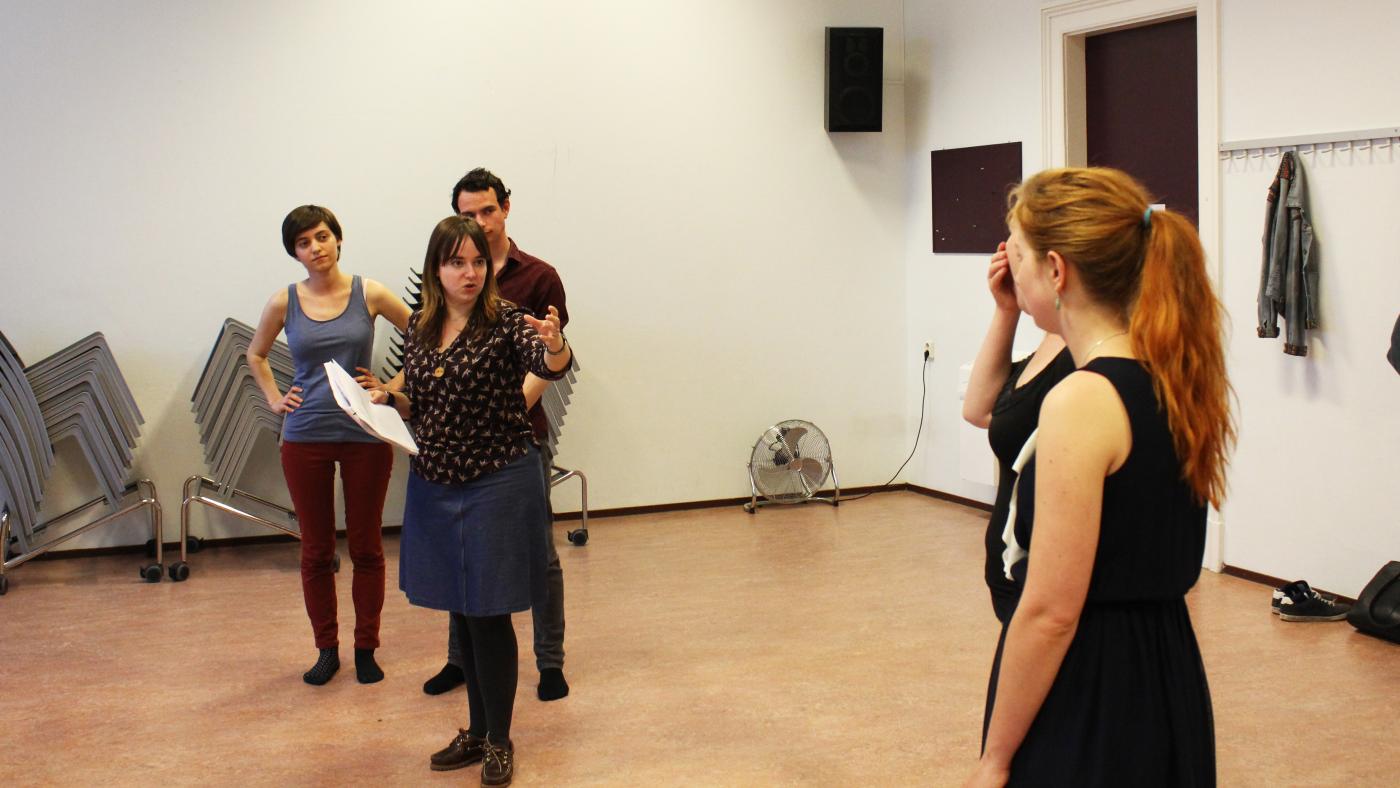Students at Parnassos perform A Midsummer Night’s dream – in English

It’s 30 degrees outside and the windows of the rehearsal studio can’t open. The ten players rehearsing are sweating profusely. “It’s a good thing, that it’s so hot in here,” director Alexandra van Kampen says. “When you’re on stage, it’s going to be hotter, and you’ll be in costume.”
After a warming up, which doesn’t seem necessary given the room temperature, the actors start playing scenes. Last week, they did a run through of the whole play; today, it’s crossing the t’s and dotting the i’s. “I’d like everyone to play with good energy,” Van Kampen states.
The opening scene
The players take their positions for the opening scene. As not everyone is present, some act as understudies for the moment. Van Kampen gives a lot of directions to the players – gestures need to be bigger, people need to talk louder so the audience will be able to hear them. It’s mostly details, from clapping one’s hands to get attention, to reactions of players who meet up in the play. When the actors play a scene without any directions, they continue to the next scene.
Original fairytale atmosphere in modern English
It’s not the first time Van Kampen is directing this play. “I’ve done it before with students in Leiden,” she says. “We put it in a modern setting, but we played it in the original Shakespearean language.”
In Utrecht, it’s the other way around. The fairytale atmosphere of the original play is back, but the play has been translated to modern English. “That way, everyone will understand what’s happening on stage, including the actors – because English isn’t their native language,” Van Kampen explains. “The story itself is rather complex. Fairies, love, and ruthless chaos,” she summarizes the story.
An exception was made for Marly, a student of Medieval Studies, who plays her part using the original lines. “That’s really great,” she says “Before I came here, I was already pretty familiar with Shakespeare. I do have to pay close attention to figure out when I have to start. The advantage for me is that my lines rhyme, and there’s a rhythm to it, so after the first sentence, the rest flows naturally.”
English with a Greek accent
Actors who don’t have to participate at any given moment, walk out to fill bottles with water, and seek the coolness of the hallways. Now and then, they peek inside to see whether they’re needed in the next scene.
The players are from all of Europe, from Greece to Germany. Still, they claim not to have any troubles learning their lines. “I do have to work on my pronunciation,” says master’s student Athena. “When I speak English, I have a Greek accent.” Law student Elise: “I had some issues with improvisation in the beginning, but you get used to it, like when you’re trying and failing to find a word, and you come up with something else.”
Because there are more parts than actors, Ivan has two parts. “I play one of the leads, but he doesn’t really show up that often,” he explains. “That’s why I play a second part, so I’ll have something to do throughout the play.” It’s his third time working with Van Kampen. “I took an acting class before. She told me she was going to do this play, so I auditioned for it.” After rehearsal, Van Kampen asks Ivan and another actress playing opposite of him to schedule an extra rehearsal.
A tight-knit group
The common factor in the group is that many of them have theatrical experience. Some of them acted in high school. “I played a lot in Greece, but that was mostly improvisation,” Athena says. “This is different. It’s more formal, because in high school, we wrote all our own lines.” Marly, too, spent time on stage in high school. “I hadn’t played in a long time before this play,” she says. “A friend o mine saw the posters and told me I should audition. During the audition I remember thinking, ‘I don’t care which part I get, as long as I get to be a part of it.’”
At the end of the rehearsal, the group moves to the bar for some drinks. A wedding taking place there forces them to change their plans. “It’s a tight-knit, kind group of people,” the players say. They talk among themselves a lot, in English. “Early on, the Dutch people spoke Dutch to each other, but that didn’t last long,” Elise says. “It’s special to be able to talk to all the people in this international group, who have come together for this play.”
The play will be performed on Friday, June 9th and Saturday, June 10th, in the theater of Parnassos at the Kruisstraat. You can buy your tickets through the Parnassos site.
For more theatre in English, check the site from the Students of Utrecht Drama Society. They perform The Taming of the Shrew at the 19th and 21th of June..